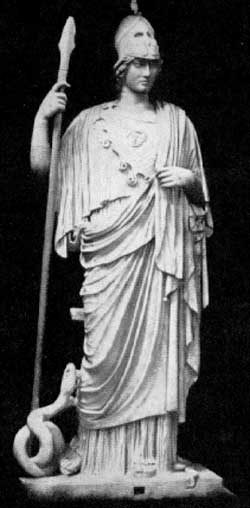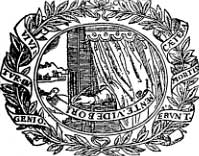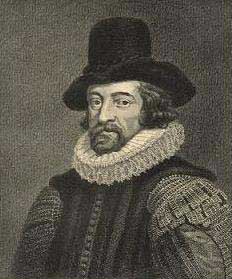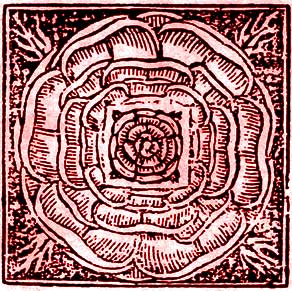The Martyrdom of Francis Bacon - His Birth, Life and Labours, 1561-1621
2006 05 12
By Alfred Dodd | sirbacon.org
Excerpts from Alfred Dodd's Book "The Martyrdom of Francis Bacon" pp. 30-35 Chapter II
 Pallas Athena was the Goddess of Wisdom and was supposed to preside over the whole of the intellectual and moral side of human life. She was the patroness of the useful and elegant arts such as weaving (felling), imparting to her devotees the peuculiar Masonic Virtues of Prudence, Courage, Preserverance. She protected the State from outward enemies. The Britannia on our English coins is taken from Pallas. She was credited with being the inventor of musical instruments. The Olive wreath denoting Peace was her emblem. She was a Creator and Preserver.
Pallas Athena was the Goddess of Wisdom and was supposed to preside over the whole of the intellectual and moral side of human life. She was the patroness of the useful and elegant arts such as weaving (felling), imparting to her devotees the peuculiar Masonic Virtues of Prudence, Courage, Preserverance. She protected the State from outward enemies. The Britannia on our English coins is taken from Pallas. She was credited with being the inventor of musical instruments. The Olive wreath denoting Peace was her emblem. She was a Creator and Preserver.
She was depicted in Greek Art with a Helmet on her head. She held the Spear of Knowledge in her right hand, poised to strike at the Serpent of Ignorance writhing under her foot. The large Helmet denoted that she waged invisibly a silent war against Sloth and Ignorance. She was usually placed on the Greek Temples with a Golden Spear in her hand. When the morning rays of the sun glinted on the weapon, causing it apparently to tremble, the common people were in the habit of saying smilingly : "Athena is Shaking her Spear again." She was thus known as "the Spear Shaker" or the "Shaker of the Spear."
This was the Goddess to whom Francis Bacon plighted his troth when a youth.
 The members of this Secret Literary Society which centered in Pallas Athena were known as The Knights of the Helmet. They had a ritual created by Francis Bacon and were initiated with an elaborate ceremonial. There was a vow, recitatives, perambulations. The Initiate was capped with the Helmet of Pallas to denote he was henceforth an "Invisible" in the fight for Human Advancement. A large Spear was placed in his hand indicative of a pen for he was to Shake the Spear of Knowledge at the Dragons of Ignorance. He thus became a "Spear-Shaker", and the head of the little band of "Spear-Shakers" was "Shake-Speare" himself, Athena's visible representative on earth.......Francis Bacon.
The members of this Secret Literary Society which centered in Pallas Athena were known as The Knights of the Helmet. They had a ritual created by Francis Bacon and were initiated with an elaborate ceremonial. There was a vow, recitatives, perambulations. The Initiate was capped with the Helmet of Pallas to denote he was henceforth an "Invisible" in the fight for Human Advancement. A large Spear was placed in his hand indicative of a pen for he was to Shake the Spear of Knowledge at the Dragons of Ignorance. He thus became a "Spear-Shaker", and the head of the little band of "Spear-Shakers" was "Shake-Speare" himself, Athena's visible representative on earth.......Francis Bacon.
This little group of law students with a few outsiders like Gabriel Harvey, a Cambridge Professor, the one-time tutor of Francis in Prosody became the brains of the secret movements in the Elizabethan Era which led to the English Renaissance. The prime Fraternity became known ultimately as the Rosicrosse.
Their activities began with an attempt to create a flexible English language, to provide words which Englishmen could express themselves, a literature written in their own tongue to take the place of Latin. To this end the Rosicrosse made translations from many languages and issued text-books dealing with all sorts of subjects. They wrote original works anonymously. They had to create an English reading public and they did so in many ways..... by feigned attacks on each other, stimulating controversy, by stories and plays of educational and moral interest. A great deal of Francis Bacon's financial difficulties in these days, and even later, was due to the fact that he had to pay for the books to be printed, and that he was running the printing and publishing side of his creative efforts at a dead loss. He was actually thrown into prison more than once for borrowed monies, such debts being incurred soley through the expenses of his idealistic "Philanthropia." These Rosicrosse books were signed with the numerical Seal of the Rosicrosse, 157 or /and 287 and often the author's real name by a numerical signature or anagram. In these books Francis Bacon had the opportunity to secrete his personal secrets which he dare not write about openly.
 Thus began the Society of the Rosicrosse, and thus the Founder began a series of writings which eventually became the Fourth Part of The Great Instauration. Francis Bacon became an anonymous writer, using many pen-names until he had learned the art of creating personalities by a perfect blending of "FORMS" or human passions. This very word, "Form", Francis Bacon uses in The New Organ of Interpretation for the understanding of all Mental Phenomena and the Thinking Man, thus leading to the creation of the "Actual Types and Models" of Mental and Emotional Passion that were "to be set before the Eyes" as on a Stage by a "Shake-spear."
Thus began the Society of the Rosicrosse, and thus the Founder began a series of writings which eventually became the Fourth Part of The Great Instauration. Francis Bacon became an anonymous writer, using many pen-names until he had learned the art of creating personalities by a perfect blending of "FORMS" or human passions. This very word, "Form", Francis Bacon uses in The New Organ of Interpretation for the understanding of all Mental Phenomena and the Thinking Man, thus leading to the creation of the "Actual Types and Models" of Mental and Emotional Passion that were "to be set before the Eyes" as on a Stage by a "Shake-spear."
The Rosicrosse Literary Society, we know, was definitely in being in 1604
"for on the 6th January the Queen held a Masque Ball, and Inigo Jones, having been asked to design the costumes, drew among other sketches one over which he himself scribbled the words, 'A ROSICROS." (F. de P. Castells, Our Ancient Brethren. p. 90)
From another angle of study Parker Woodward says :
"There is very little doubt that Francis formed a Secret Society for the prosecution of his scheme for the Advancement of Learning, the Maintenance of Religion, and the Improvement of Manners, Morals, Arts, and Sciences......Overt signs can be collected only by watchful care over a number of years."(Sir Francis Bacon, p.54)
The same author, writing of the year 1592, says : 'Francis was at this time, if not earlier, well helped by a staff of men capable of writing a sort of shorthand, who afterwards transcribed their work." (Early life of Lord Bacon. p. 59)
See Elizabethan Scriveneries, in Shakespeare, Creator of Freemasonry, by Alfred Dodd.
Under the Cloak of the Secret Literary Society Francis Bacon built up his "Forms", the dramatic creation of Personalities; speaking his own thoughts to the world through their mouths. Now can be better understood his saying : "Motley's the only wear : It is my ONLY SUIT......."
"Invest me in my Motley: give me leave
To speak my Mnd, and I will through and through
Cleanse the foul body of th' infected world
If they will patiently receive my medicine.
As You Like It
(written presumably prior to 1600: First Printed and Published 1623.)
So......in the "despised Weed" (Disguise) of a Dramatist, Shakespeare, he "procured the good of all men."
("I have , though in a DESPISED WEED, procured THE GOOD OF ALL MEN." from Francis Bacon's Prayer written in 1621;
"Why do I still keep INVENTION (Poesy) in a NOTED WEED." Shakespeare's Sonnets )
Through his stories he tried to uplift common humanity educationally and ethically, giving his countrymen, in his open works as well as his concealed ones, a vocabulary of some twenty thousand words. He painted broad canvasses of Life that taught the triumph of goodness and the dethronement of evil......great epics of moral power. He showed in the most practical manner, to succeeding generations of scholars, that he knew how to hold the mirror up to Nature, because he knew the secret of applied metaphysics, the interpretation of Nature according to the Novum Organum, i.e., PART III. In short, he demonstrated that he fully understood the laws that govern human nature, and how to blend creative effort along definite lines in order to produce characters in Art Form, the various "Forms" that live in the Great Plays. Had he openly declared his views that he put into the mouths of his various characters, Franis Bacon would have been brought into conflict with Church and State. He wrote his views under the Mask of a living man, as Sir Nicholas had done. This man was buried in the heart of the country.....literally buried in Stratford Church and had been for seven years when Part IV of the "Types and Models", interpretive of Nature, were mysteriously produced in 1623 under the title of Mr. William Shakespeares Comedies, Histories and Tragedies.This book contains the various "Forms" of mental and moral passion of "Light and Heat " to illustrate his experimental Natural Philosophy.
While he was establishing the educative aspect of Rosicrosse activities by printing and publishing text books,etc., Francis Bacon has also began another important work intended to be the crown of his labours, the establishment of an organized, Brotherhood with Rites and Ceremonial based on the Ancient Mysteries, Classical Myths, the craft-customs of the defunct guild of operative masons.... a Rite in which the Nature Wisdom of Egypt should be blended with the simple, ethical New Commandment of Jesus...."That ye LOVE one another." It was, virtually, a remodelling of the Contiental Templar Knights Secret Order which was then almost moribund....confined to a fast diminishing select few, and had outlived its former usefulness and grandeur. Francis Bacon aimed at remoulding the Ceremonial on broader grounds that would have, ultimately, a popular appeal as well as an esoteric one. He finally redrafted the Nine Degrees of the Templars into Thirty-Three, half of which were based on purely Christian Ethical Concepts. "Thirty-Three" was chosen as the Highest Degree because the number "33", was the numerical signature of "Bacon" :
B A C O N
______________
2 +1+ 3+ 14+ 13 = 33
The first modern Freemasons' Lodge was held at Twickenham Park and Gray's Inn. It consisted of Three Degrees and the Royal Arch. It's first members were drawn from the Rosicrosse Literary Society : A Rosicrosse-Mason was a Brother who was privy to the Secrets of the Craft and the Rose.

Woodblock emblem on the title-page of A Collection of Apothegmes New and Old, by the Right Honourable Francis Bacon, Baron of Verulam, Viscount St. Alban, published in London in 1661, printed by Sarah Griffin for William Lee.
Francis Bacon created the Higher Christian Degrees gradually through the years, the majority being tried out at Twickenham Lodge. In 1620 all the Degrees had been created with their traditional histories, feigned tales and rituals; and the Brotherhood was well established in Lodges, Chapters and Presbyteries dotted all over the Kingdom England, Ireland, Scotland, Wales and the Continent. It had even spread through military and naval officers and gentlemen to the New World.
Part VI was therefore actually in being in the form of a series of Ethical Rituals, some simple, some elaborate thirty-three in all and regularly worked secretly by an organized Brotherhood who recognized each other, unsuspected by the "uninstructed world", through secret words and tokens. Had the Fraternity been known to exist it would have been stamped out as a menace, for Authority would never have tolerated a "Commonwealth" within a "Commonwealth". The Church would have frowned on an Ethical System as subversive to Christianity, which all the divines then held could only be interpreted by creeds and dogmas. So Freemasonry was planted secretly like a bulb in the darkness and left to root itself and grow : And it was planned eventually to emerge into the Light of Day exactly one hundred years after the publication of the 1623 Great Shakespeare Folio... in 1723. (with The Book of Constitutions of The Freemasons, by Rev. James Anderson, being the first annoucement to the world of the Brotherhood.)
But while Freemasons' Lodges lay concealed from sight, there was a vigourous movement initiated by the Rosicrosse to bring ethical principles to public notice especially among liberal-minded thinkers and to familiarize the mass-mind with idealism in its loftiest form..... the amelioration of the common lot. In 1614 there was printed in Cassel (Germany) and elsewhere for the next few years, a series of Manifestoes based on the Theme, The Universal Reformation of the Whole Wide World, the Fama Fraternitatis and the Confessio Fraternitatis. From what quarter they proceeded no one knew. But they were circulating in manuscript in 1610 in the Tyrol, and there is now evidence that they were in circulation even before this date in England. There is also sufficient proof that the writer of the manifestoes was Francis Bacon, who had them translated into German and published anonymously. They were a call to all good men, irrespective of creedal belief, to unite against the evils that afflicted humanity on the lines of an Ethical Brotherhood.
The Rosicrucian booklets created a great stir at the time and much controversy. Many letters were written stating the willingness of the writers to join such a Brotherhood. But the anonymous author never replied to any of his correspondents and after some years the agitation died down. The seeds of curiosity had, however, been scattered abroad openly. The Fama and other Rosicrucian literature were studied and their principles practically applied by some enthusiasts to everyday life, by forming small commonwealth's of their own. Some parties even migrated to the New World that the might live their own lives, modelled on the Fama, free from persucution. Genuine inquirers were, however, noted and many were quietly absorbed into the secret Craft Lodge of Free and Accepted Masons, being, later, passed on to the still more esoteric Rosicrucian College.
Before 1616 Francis Bacon had compiled Part V of The Great Instauration the Rosicrucian Manifestoes and published them openly to the world, besides having established the secret Colleges of he Fratres. He had given the world anonymously something on account of the full, ethical system of Rite and Cermonial, that by allegory and symbol gave a spiritual interpretation of the Universe...the system of Natural Philosophy, Freemasonry, timed to appear a hundred years later. The Rosicrucian pamphlets were "to serve as wayside Inns in which the mind might rest." They are still regarded as Inns for mental refreshment by many persons today who find their highest happiness in obedience to the teachings of the Rosicrucian literature.
This aspect of Francis Bacon's concealed activities must be borne in mind in order to understand his character....the secret ideals which, after all, were the first things in his intentions, and which inevitably had its repercussions on the open life which has been so variously interpreted and misinterpreted by so many critical biographers. His "Philanthropia" led him into the paths of an "Active Philosophy", so he termed it, as a social reformer and an ethical teacher. These were the touchstones by which he tested his personal actions. Thought had to be combined with action, otherwise the noblest thoughts were meaningless, insincere, and futile. It should lead essentially to practical results.
The three concealed Parts of his system were bound together by education, reform, ethics which he could not openly champion in an age of tyranny, intolerance and ignorance. His creation of a vast vocabulary, his moral tales of dramatic passion that even the unlettered could understand, his Rosicrucian ferment thrown upon the stagnant waters of society and the establishment of a Brotherhood can now be seen in their influence on the Elizabethan Era and succeeding generations. The Mystery of Freemasonry, the Mystery of the Rosicrucian Manifestoes, the Mystery of the Shakespeare Plays can all be traced to one source the concealed Architect and Master Builder. They are the missing parts of The Great Instauration which Spedding and Ellis, with other eminent scholars, having searched for in vain, eventually concluding with a sigh that he never wrote them. What they all overlooked was this: That Francis Bacon's System not only embraced the Reformation of Physics and Physical Well-being but the Invisible Worlds of Mental and Moral Thought and Action: and that his Plan, copied from the "Ancients", was to deliver his Philosophy by TWO Methods one Public and one PRIVATE. In Valerius Terminus, Ch.18, he says he will use
"the discretion anciently observed..... of publishing part and reserving PART TO A PRIVATE SUCCESSION, and of publishing in such a manner whereby it may not be to the taste or capacity of all but shall as it were single and adopt his reader....both for the avoiding of abuse in the excluded, and the strengthening of the Affection in those ADMITTED," i.e. exclusion by Blackball.
[This is a clear intimation of Initiation into a Secret Order.]
"Now my plan for publication is this : I wish to be published to the world and circulate from mouth to mouth ; the rest I would have passed from hand to hand with selection and judgment. My Formula of Interpretation.....will thrive better if committed to the charge of some fit and selected minds AND KEPT PRIVATE."
"Elsewhere he talks of an ORAL METHOD OF TRANSMISSION, which reminds one at once of Masonry." (W. F.C. Wigston, Bacon and the Rosicrucians, p.44)
"I , going the same road as the Ancients, have something better to produce, says Francis. This is, then, the Secret of The Great Instauration or RESTORATION. He has returned on the road to Antiquity, copying the Dramatic Rites of the Mysteries in their Moral Applications by Degree Methods, and seeks to outvie the Dramatic Art of AEschylus, Euripides and Sophocles.
This confirms more than sufficient proof that Francis Bacon was more than a Publicist. He was a secret Teacher with his Secret School of Disciples. Spedding and others never took these SECRET PUBLICATIONS into account. They ignored his plain words. They never sought for them; and they never sought for his Secret Society that was to be maintained by "ORAL TRANSMISSION." They therefore missed entirely the full import of his Labours his concealed work outlined in Parts IV, V, VI.
Over his own name he never published anything until he was forty-four years of age beyond ten short Essays in 1597. The best years of his life have apparently slipped away from him barren of creative effort. Actually, they were years overflowing with his concealed labours. On the definite completion of he basis from which could be launched the attack on the Citadels of the Kingdom of Ignorance (the secret bases from which sprang our new outlook on Literature; i.e. the Renaissance crowned by the production of the Shakespeare Plays: the Royal Society : the Theosophic Rosicrucian College : the Ethical Craft of Masonry: the New Philosophical and Scientific outlook whose watchwords were "Utility and Progress") he then and not until then started the ball rolling openly by printing The Advancement of Learning in 1605. It was PART I of the Instauration or the Revival of Learning.
In 1620 was published PART II, the Novum Organum or The New Organ of Interpretation.
In the Sylva Sylvarum, published in 1627, this book being "A Collection of Collections" (Spedding) or "the materials out of which anything is to be constructed," is to be found
"an accumulation of facts, beliefs, fables, and conjectures ranging over all the fields of Nature." (Nichol)
which Francis Bacon had been collecting all his life. "This Natural History," said he, "is the World as God made it and not as men have made it," and, added Dr. Rawley, his chaplain, in deeply significant words which the Universities have never interpreted :
"He that looketh attentively shall find that these particulars have A SECRET ORDER (Preface, S.S., 1627)
[The Masonic work entitled The New Atlantis was bound with the Sylva Sylvarum and contains particulars of his "Secret Orders."]
This was PART III of the Instauration. This "Collection" of experiments and alleged scientific facts was Francis Bacon's first attempt, says Dr.Rawley,
"to write such a Natural History as may be Fundamental to the Erecting and Building of a True Philosophy; for the Illumination of the Understanding; the Extracting of Axioms; and the producing of many Noble Workes and Effects."
Apart from the fact that the "Author" of the Shakespeare Plays must have possessed similar peculiar and intimate out-of-the-way information respecting the phenomena of Nature and Human Nature, the Sylva Sylvarum, with other books, may be said to be the foundation-stone of the Royal Society of which Francis Bacon was the direct instigator and founder according to its first President, Dr. Spratt. Francis Bacon's idea of a Solomon's House of Science for the collection of natural facts, placed in a systemized order, led to the establishment of the Gresham College or Academy of 1660 and then to the Royal Society of Charles II. Boyle, Wren, Moray, Ashmole, and Locke were the men who directly founded the R. S., and they were also the driving force in Speculative Masonry. This connection between Masonry and the Royal Society in its early history is extremely significant. "Solomon's House" is the exoteric side of his System, while "Solomon's Temple" is the esoteric teaching to be found in Rosicrucianism and Freemasonry the ethical interpretation of the facts of Nature.
This was the reason why The New Atlantis was issued with the Sylvarum in order to identify Francis Bacon's "Secret Order" with the Symbolism of Nature : for he that looketh attentively shall find that the Atlantis indeed discloses "A Secret Order", but only a Mason can detect it. There are, however, other "Secret Orders," of a different kind in the Work not yet disclosed. The New Atlantis, which was afterwards published as The Land of the Rosicrucians, reeks with Masonic Symbolism. James Hughan, one of the leading Masonic authorities in his day, said :
"The New Atlantis seems to be, and probably is, THE KEY TO THE MODERN RITUALS OF FREEMASONRY."
It was intended to be regarded as the preface to them. The Author left it with these significant words : "A WORK Unfinished ; The rest was not PERFECTED."
It is clear that by Easter Sunday, 1626, when Francis Bacon departed from the scene of his activities, he had definitely completed his philosophic system and established the Movements connected with them. The Shakespeare Plays had been gathered together in 1623 in an omnibus volume containing twenty plays printed for the first time; the sixteen previously printed were largely re-written; and several never heard of previously such as Henry VIII were inserted. (Shaksper of Stratford, be it remembered, died in 1616.) Shakespeare's Sonnet-Diary he bequeathed to his Fraternities (Xmas 1625). We may term this his last act...........
Article from: http://www.sirbacon.org/doddch2martyrdom.htm
Related: The Martyrdom of Francis Bacon
Sir Francis Bacon AKA William Shakespeare
Genealogy website of Gerald Francis Bacon
Sylva Sylvarum
Knights of the Helmet
Secret Mysteries of America's Beginnings - Volume One: The New Atlantis
New Atlantis by Francis Bacon
Islamic Origin of the Rose-Croix?
